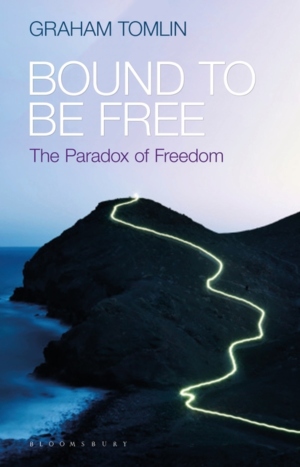Bound to be Free By Graham Tomlin
Explores how the Christian faith has much to say about culture's confused and obsessive relationship with freedom - the kind of apologetics that we need to be advancing much more deeply
 Bound to be Free: The Paradox of Freedom
Bound to be Free: The Paradox of Freedom
By Graham Tomlin
Bloomsbury
ISBN 978-1-4729-3950-0
Reviewed by Paul Goodliff
This exploration of the way in which the freedom we have in Christ speaks to the multiple ways in which our culture values freedom — often, an illusion of freedom — is both accessible and timely. Prompted by an article written by Tomlin in the wake of the attack on the offices of Charlie Hebdo in Paris in 2015 by Islamists, this clearly shows how neither the kind of freedom of expression exercised by the cartoonists of Charlie Hebdo, and their countless supporters, nor the extremes of constraints upon freedom epitomised by the Islamists' cries of "blasphemy" for anything that offends their religious sensibilities, are the proper responses for Christians in Western, secular society.
Both the United States and the European project are built upon notions of freedom derived from the Enlightenment, and even our own headlong flight from Europe in the form of Brexit is accompanied by the calls for freedom from Brussels. Freedom of movement, freedom of choice and freedom of expression are all politically-charged ideas, as are their counterpoints, Islamism, the rise of restraint against freedoms in Russia and the new Right in Europe. These are the big ideas that the Christian faith surely has much to say about, and Tomlin points us in the direction to find its voice.
He shows how the architects of freedom — Locke, Rousseau, Mill — create the philosophical background to the current obsession with freedom; and continues with discussions of Foucault, Charles Taylor, John Gray and Iris Murdoch. Do not be put off, it is all written with a clarity and precision that brings their ideas alive. There follow chapters that explore the theological roots of Christian freedom, in St Paul and those who developed his radical freedom —Augustine, Anselm, Aquinas, Ockham and Luther.
The closing two chapters consider human rights to freedom, and the Christian ideal of freedom to be for others, for community, from self and for God.
This is an exemplary way of engaging with culture's big ideas, and in this way is the kind of apologetics that we need to be advancing much more deeply. In a society that just does not understand 'sin' — which is not to deny its fundamental reality, but simply to suggest that it is no longer the 'way in' for conveying the Gospel — perhaps exploring how the Christian faith has much to say about culture's confused and obsessive relationship with freedom, and offers the truly liberating freedom of Christ, is a more effective beginning of engagement with those who dismiss Christianity as an irrelevance.
The Revd Dr Paul Goodliff is the General Secretary of Churches Together in England
Baptist Times, 14/09/2018